FTC disclaimer. This post may contains affiliate links, and I will be compensated if you purchase through one of my links.
November quotes capture the essence of gratitude, reflection, and the beautiful transition into winter’s embrace.
Why This Collection Matters
As autumn reaches its golden finale, this eleventh month brings a unique opportunity for introspection and thankfulness.
The season invites us to pause amid falling leaves and crisp air, encouraging deeper connections with what truly matters.
Thanksgiving traditions remind families and communities to celebrate abundance, while shorter days naturally turn thoughts inward toward meaningful reflection.
Wisdom for Every Mood
This carefully curated collection offers inspirational words from poets, philosophers, and thought leaders who have captured the month’s transformative spirit.
Readers will discover quotes celebrating gratitude, seasonal change, and the quiet beauty of late autumn.
Each selection has been verified for accuracy and properly attributed to honor the original voices behind these timeless insights.
Themes That Resonate
The compilation covers diverse perspectives—from harvest celebrations to contemplative winter preparation.
Whether seeking motivation for Thanksgiving gatherings, social media captions, or personal journaling prompts, these thoughtfully organized passages provide authentic expression for the season’s emotions.
The collection bridges traditional wisdom with contemporary relevance, offering words that resonate across generations and cultures, making it a trusted resource for anyone seeking to articulate the profound yet gentle shift this penultimate month brings to our hearts and homes.
Also Read: 60 Happy Fall Autumn Quotes To Bring Positive Vibes
November Quotes for Thanksgiving Celebrations
Thanksgiving transforms this month into a season of togetherness and abundance.
These carefully selected quotations capture the warmth of family gatherings, the joy of shared meals, and the profound appreciation that defines this cherished holiday tradition across homes and hearts.
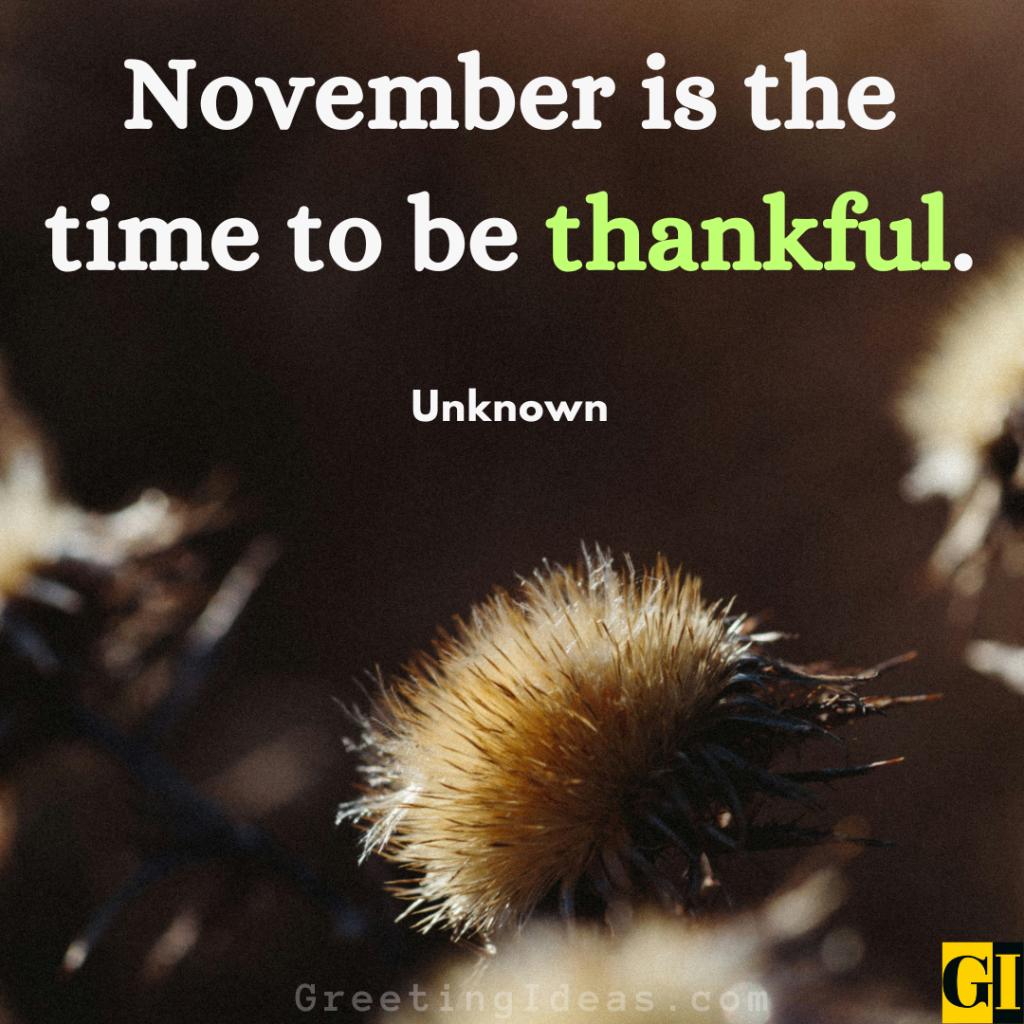
Gratitude can transform common days into thanksgivings, turn routine jobs into joy, and change ordinary opportunities into blessings. — William Arthur Ward, American writer and teacher
Ward’s words remind us that thankfulness isn’t reserved for one day but can reshape our entire perspective on daily life.
William Arthur Ward (1921-1994) was one of America’s most quoted inspirational writers, authoring thousands of maxims and meditations that appeared in Reader’s Digest and other publications throughout his career as an educator.
Thanksgiving is a time of togetherness and gratitude. — Nigel Hamilton, British biographer and author
Hamilton captures the dual essence of the holiday: connection with loved ones and appreciation for life’s gifts.
Nigel Hamilton is an award-winning British biographer known for his extensive works on historical figures, including JFK and Bill Clinton, bringing historical moments to life through meticulous research.
Gratitude unlocks the fullness of life. It turns what we have into enough, and more. — Melody Beattie, American author and counselor
Beattie shows how appreciation fundamentally changes our relationship with what we already possess.
Melody Beattie is a bestselling self-help author whose book Codependent No More has sold millions of copies, drawing from her personal recovery journey to help others heal.
As we express our gratitude, we must never forget that the highest appreciation is not to utter words, but to live by them. — John F. Kennedy, 35th U.S. President
Kennedy challenges us to demonstrate thankfulness through actions rather than merely speaking about it.
John F. Kennedy (1917-1963) served as the 35th President of the United States from 1961 until his assassination, known for his inspiring oratory and leadership during the Cold War era.
Also Read: 45 Famous Pumpkin Carving Quotes For Halloween
Thanksgiving, after all, is a word of action. — W.J. Cameron, Canadian-American journalist and advisor
Cameron reframes the holiday as an active practice rather than a passive sentiment or single celebration.
W.J. Cameron (1878-1955) was a journalist and spokesman for Henry Ford, delivering weekly radio talks that reached millions and shaped public opinion during the early 20th century.
Give thanks for a little and you will find a lot. — Hausa Proverb, traditional West African wisdom
This ancient proverb teaches that appreciating small blessings opens our eyes to the abundance already surrounding us.
The Hausa people are one of Africa’s largest ethnic groups, primarily located in northern Nigeria and Niger, with a rich oral tradition of proverbs passed down through generations.
In every thing give thanks: for this is the will of God. — 1 Thessalonians 5:18, Biblical scripture
This sacred text encourages believers to maintain gratitude regardless of circumstances or challenges faced.
1 Thessalonians is one of the earliest Christian texts, written by the Apostle Paul around 50-51 AD to the church in Thessalonica, offering guidance on faith and daily living.
Thanksgiving dinners take eighteen hours to prepare. They are consumed in twelve minutes. Half-times take twelve minutes. This is not coincidence. — Erma Bombeck, American humorist and columnist
Bombeck’s humorous observation perfectly captures the reality of holiday preparations versus actual celebration time.
Erma Bombeck (1927-1996) was a beloved American humorist whose syndicated column appeared in over 900 newspapers, chronicling suburban family life with wit and warmth for three decades.
Thanksgiving is one of my favorite days of the year because it reminds us to give thanks and to count our blessings. — Joyce Meyer, Christian author and speaker
Meyer emphasizes how this holiday serves as an intentional reminder to pause and acknowledge life’s gifts.
Joyce Meyer is a charismatic Christian author and speaker whose ministry reaches millions worldwide through television broadcasts, conferences, and over 100 published books on practical faith.
Gratitude is the inward feeling of kindness received. Thankfulness is the natural impulse to express that feeling. — Henry Van Dyke, American author and clergyman
Van Dyke distinguishes between internal appreciation and its outward expression, both essential to true thankfulness.
Henry Van Dyke (1852-1933) was a Presbyterian minister, Princeton professor, and diplomat who wrote extensively on spirituality and nature, including the beloved Christmas story The Other Wise Man.
Forever on Thanksgiving Day the heart will find the pathway home. — Wilbur D. Nesbit, American poet and journalist
Nesbit captures how this holiday creates an emotional compass pointing us toward family and belonging.
Wilbur D. Nesbit (1871-1927) was a Chicago-based poet and journalist whose accessible verses about everyday life appeared in numerous magazines and newspapers during the early 20th century.
Thanksgiving is the holiday that encompasses all others. All of them, from Martin Luther King Day to Arbor Day to Christmas to Valentine’s Day, are in one way or another about being thankful. — Jonathan Safran Foer, American novelist
Foer positions gratitude as the universal thread connecting all celebrations throughout the year.
Jonathan Safran Foer is an acclaimed contemporary novelist known for Everything Is Illuminated and Extremely Loud & Incredibly Close, exploring themes of memory, loss, and human connection through innovative narrative techniques.
Also Read: 90 Must Read December Quotes to End the Year Positively
Autumn Transition and Fall Farewell Quotes
Late autumn marks nature’s graceful descent into winter’s quiet embrace.
These reflections honor the bittersweet beauty of fading warmth, golden landscapes, and the contemplative mood that accompanies seasonal change as the year prepares for its final chapter.
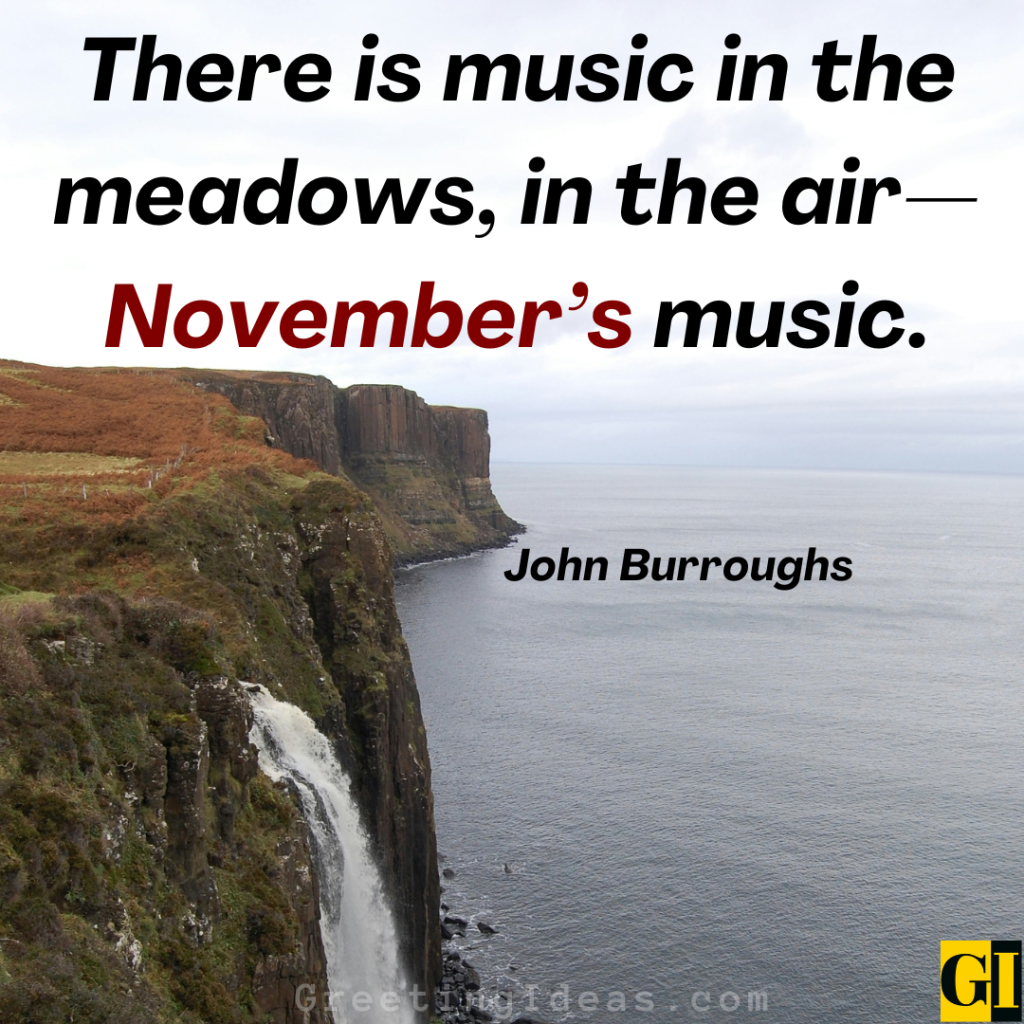
Autumn carries more gold in its pocket than all the other seasons. — Jim Bishop, American journalist and author
Bishop celebrates the visual richness and abundance that characterizes this transformative season’s landscape.
Jim Bishop (1907-1987) was a prolific American journalist and author best known for his Day books, including The Day Lincoln Was Shot, pioneering the minute-by-minute narrative style of historical writing.
November comes and November goes, with the last red berries and the first white snows. — Clyde Watson, American children’s author and poet
Watson poetically captures the month’s position as nature’s bridge between autumn’s color and winter’s purity.
Clyde Watson is an American children’s book author and poet who created the beloved Father Fox series, crafting lyrical verses that introduce young readers to seasonal rhythms and nature’s patterns.
The leaves fall, the wind blows, and the farm country slowly changes from the summer cottons into its winter wools. — Henry Beston, American naturalist and writer
Beston uses clothing metaphors to describe nature’s seasonal wardrobe change from lightness to protective warmth.
Henry Beston (1888-1968) was an American nature writer whose classic The Outermost House chronicled a year living on Cape Cod’s beaches, establishing him as a pioneer of environmental literature.
Autumn is a second spring when every leaf is a flower. — Albert Camus, French philosopher and author
Camus reframes falling leaves not as death but as a spectacular floral display rivaling spring’s blossoms.
Albert Camus (1913-1960) was a French-Algerian philosopher, author, and Nobel Prize winner who explored absurdism and existentialism through novels like The Stranger and philosophical essays on human existence.
Also Read: 100 Inspiring Live A Simple Life Quotes And Sayings
November’s sky is chill and drear, November’s leaf is red and sear. — Walter Scott, Scottish historical novelist and poet
Scott acknowledges the month’s harsher qualities while honoring the intense beauty of autumn’s final moments.
Sir Walter Scott (1771-1832) was a Scottish historical novelist and poet who popularized historical fiction through works like Ivanhoe and Rob Roy, profoundly influencing European Romanticism.
The morns are meeker than they were, the nuts are getting brown; the berry’s cheek is plumper, the rose is out of town. — Emily Dickinson, American poet
Dickinson observes subtle seasonal shifts with her characteristic attention to nature’s delicate transformations.
Emily Dickinson (1830-1886) was a reclusive American poet who wrote nearly 1,800 poems during her lifetime, though fewer than a dozen were published before her death, revolutionizing poetry with her unconventional style.
I cannot endure to waste anything so precious as autumnal sunshine by staying in the house. — Nathaniel Hawthorne, American novelist
Hawthorne expresses the urgency to savor late autumn’s fleeting warmth before winter’s arrival.
Nathaniel Hawthorne (1804-1864) was an American novelist and short story writer best known for The Scarlet Letter, exploring themes of sin, guilt, and redemption in Puritan New England.
Fall has always been my favorite season. The time when everything bursts with its last beauty, as if nature had been saving up all year for the grand finale. — Lauren DeStefano, American author
DeStefano portrays autumn as nature’s magnificent closing performance before winter’s curtain falls.
Lauren DeStefano is a contemporary American author known for her The Chemical Garden trilogy, writing dystopian young adult fiction that explores themes of mortality, freedom, and human resilience.
Autumn wins you best by this, its mute appeal to sympathy for its decay. — Robert Browning, Victorian poet
Browning suggests that autumn’s emotional power comes from witnessing beauty gracefully accepting impermanence.
Robert Browning (1812-1889) was an influential Victorian poet known for his dramatic monologues and optimistic philosophy. He married fellow poet Elizabeth Barrett Browning in one of literature’s most famous romances.
There is something incredibly nostalgic and significant about the annual cascade of autumn leaves. — Joe L. Wheeler, American author and editor
Wheeler connects falling foliage to deeper feelings of memory, time’s passage, and life’s cyclical nature.
Joe L. Wheeler is an American anthologist and author who has compiled numerous collections of inspirational stories and Christian literature, preserving classic tales for contemporary readers.
November always seemed to me the Norway of the year. — Emily Dickinson, American poet
Dickinson characterizes the month with Nordic qualities: austere, beautiful, and touched by coldness.
Emily Dickinson (1830-1886) lived most of her life in Amherst, Massachusetts, developing a unique poetic voice that explored death, immortality, and nature through compressed, enigmatic verses that defied Victorian conventions.
The tints of autumn—a mighty flower garden blossoming under the spell of the enchanter, frost. — John Greenleaf Whittier, American Quaker poet
Whittier personifies frost as a magician transforming ordinary leaves into an extraordinary garden display.
John Greenleaf Whittier (1807-1892) was an American Quaker poet and abolitionist whose works championed social justice and captured New England rural life, including the beloved winter poem Snow-Bound.
Also Read: 25 Hello September Quotes Sayings to Celebrate Fall Season
Gratitude and Reflection Quotes
This eleventh month naturally invites introspection and appreciation.
These thoughtful expressions guide readers toward deeper thankfulness, encouraging mindful pauses to acknowledge blessings, lessons learned, and the grace found in life’s journey through another year’s passage.
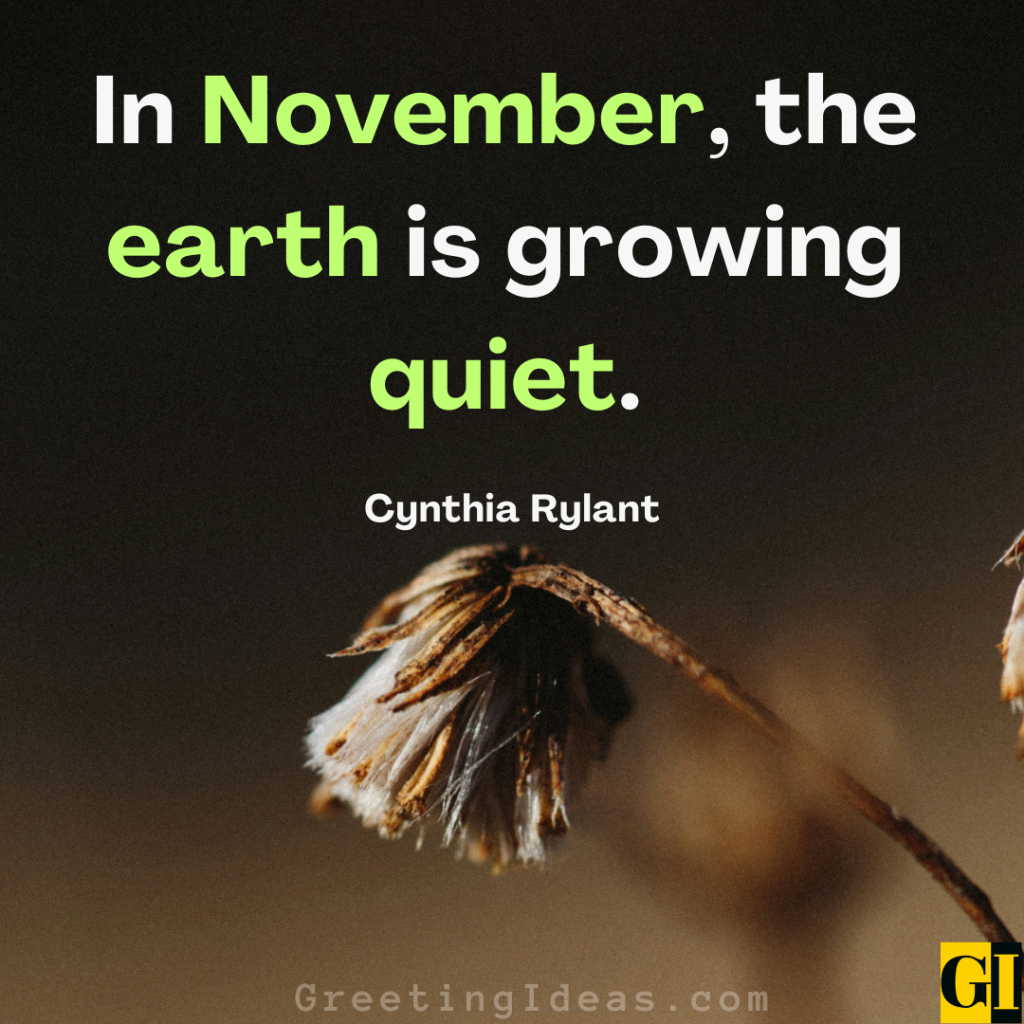
Gratitude turns what we have into enough. — Aesop, ancient Greek fabulist
Aesop’s simple wisdom shows how appreciation fundamentally transforms our perception of abundance versus scarcity.
Aesop (c. 620-564 BCE) was an ancient Greek storyteller credited with a collection of fables featuring anthropomorphized animals that convey moral lessons, though historians debate whether he was a real historical figure.
When you arise in the morning, think of what a precious privilege it is to be alive—to breathe, to think, to enjoy, to love. — Marcus Aurelius, Roman Emperor and Stoic philosopher
Aurelius reminds us that consciousness itself deserves daily recognition as an extraordinary gift.
Marcus Aurelius (121-180 CE) was a Roman Emperor and Stoic philosopher whose Meditations, written as personal reflections during military campaigns, became one of history’s most influential philosophical texts.
Reflect upon your present blessings, of which every man has many—not on your past misfortunes, of which all men have some. — Charles Dickens, English novelist
Dickens advises directing mental energy toward current blessings rather than dwelling on historical hardships.
Charles Dickens (1812-1870) was a Victorian novelist whose works, like A Christmas Carol and Oliver Twist, exposed social inequalities while celebrating human kindness, making him one of literature’s most beloved storytellers.
Gratitude is not only the greatest of virtues, but the parent of all others. — Marcus Tullius Cicero, Roman philosopher and statesman
Cicero positions thankfulness as the foundational virtue from which all other positive qualities emerge.
Marcus Tullius Cicero (106-43 BCE) was a Roman statesman, lawyer, and philosopher whose eloquent writings on ethics, politics, and rhetoric profoundly influenced Western philosophy and political thought.
Also Read: 90 Famous Letting Go Of Anger Quotes For Mental Peace
Acknowledging the good that you already have in your life is the foundation for all abundance. — Eckhart Tolle, German-born spiritual teacher and author
Tolle suggests that recognizing current blessings creates the energetic foundation for attracting more goodness.
Eckhart Tolle is a German-born spiritual teacher and author whose book The Power of Now became an international bestseller, teaching millions about presence, consciousness, and spiritual awakening.
The grateful heart sits at a continuous feast. — Proverb, traditional wisdom
This timeless saying illustrates how thankfulness creates perpetual contentment regardless of external circumstances.
This proverb’s origins are uncertain, appearing in various forms across cultures and religious traditions, representing collective human wisdom about gratitude’s transformative power passed through generations.
Gratitude makes sense of our past, brings peace for today, and creates a vision for tomorrow. — Melody Beattie, American author and counselor
Beattie demonstrates how appreciation works across all time dimensions, healing, centering, and inspiring simultaneously.
Melody Beattie overcame addiction and codependency to become one of America’s most trusted voices on recovery, authoring numerous bestselling books that blend personal experience with practical guidance.
Let us be grateful to people who make us happy; they are the charming gardeners who make our souls blossom. — Marcel Proust, French novelist
Proust beautifully acknowledges how others cultivate joy within us, deserving recognition as soul gardeners.
Marcel Proust (1871-1922) was a French novelist whose seven-volume masterwork In Search of Lost Time revolutionized literature through its exploration of memory, time, and consciousness.
When I started counting my blessings, my whole life turned around. — Willie Nelson, American country music legend
Nelson’s personal testimony shows gratitude’s transformative power from lived experience rather than abstract theory.
Willie Nelson is an iconic American country music singer-songwriter and activist who has released over 200 albums across seven decades, known for his distinctive voice and outlaw country style.
Appreciation can make a day, even change a life. Your willingness to put it into words is all that is necessary. — Margaret Cousins, American editor and author
Cousins emphasizes that expressing gratitude verbally amplifies its impact on both giver and receiver.
Margaret Cousins (1905-1996) was a longtime editor at Good Housekeeping and McCall’s magazines, shaping American women’s literature and journalism during the mid-20th century.
Gratitude is the healthiest of all human emotions. The more you express gratitude for what you have, the more likely you will have even more to express gratitude for. — Zig Ziglar, American motivational speaker
Ziglar connects thankfulness to psychological well-being and creates a positive feedback loop of appreciation.
Zig Ziglar (1926-2012) was a legendary American motivational speaker and author whose optimistic philosophy and sales training programs influenced millions worldwide through books, seminars, and recordings.
The struggle ends when gratitude begins. — Neale Donald Walsch, American author and spiritual teacher
Walsch suggests that shifting into appreciation mode naturally dissolves resistance and internal conflict.
Neale Donald Walsch is an American author best known for his Conversations with God series, which presents spiritual teachings through a dialogue format that has sold millions of copies worldwide.
Also Read: 35 Hello and Welcome October Quotes, Sayings, Phrases
Birthday Blessings for November Born
Those entering the world during this transitional month carry special energy between seasons.
These celebratory words honor their unique timing, autumn wisdom, and the particular magic of beginning life’s journey as nature prepares for renewal and rest.
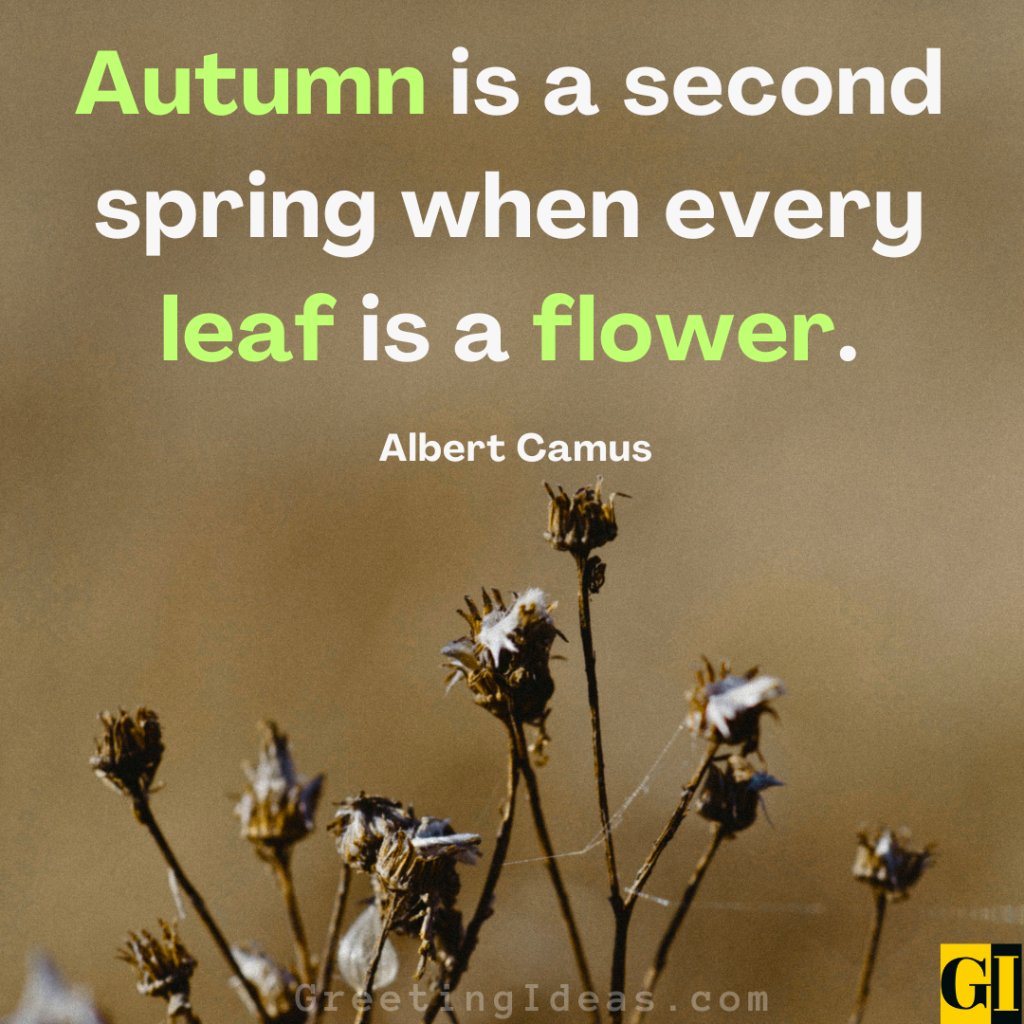
November birthdays bring the gift of depth, reflection, and the wisdom of changing seasons. — Contemporary saying
This modern expression celebrates the contemplative qualities naturally associated with this month’s arrivals.
This contemporary saying reflects current cultural beliefs about birth months influencing personality, drawing from ancient astrological traditions adapted for modern spiritual and self-help contexts.
Born in the month of thankfulness, you remind us daily that gratitude is the best gift. — Anonymous
This tribute links the birthday month to the individual’s ongoing influence, serving as a living reminder of appreciation.
Anonymous contributions represent collective wisdom and shared human experience, often expressing universal truths that resonate across cultures without attribution to a single author.
A November birthday is nature’s way of saying you’re rare, valuable, and perfectly timed. — Popular sentiment
This affirmation links birth timing to personal worth and the universe’s intentional placement of souls.
Popular sentiments like this emerge from greeting card culture, social media, and contemporary spirituality movements that celebrate birth months as meaningful indicators of personal characteristics.
November babies: where autumn’s wisdom meets winter’s strength. — Contemporary expression
This phrase honors those born during the seasonal transition, as they embody the qualities of both periods.
Contemporary expressions about birth months reflect ongoing human fascination with astrology, seasonal symbolism, and the desire to find meaning in timing and cosmic patterns.
Also Read: Aesthetic Yellow Quotes For Positive Happy Vibes
To be born in November is to carry forever the golden light of autumn in your soul. — Modern birthday wish
This poetic blessing suggests that birth month energy permanently influences character and spiritual essence.
Modern birthday wishes blend traditional blessing formats with contemporary spiritual language, creating personalized affirmations that honor individual birth timing as spiritually significant.
November birthdays are sprinkled with autumn magic and Thanksgiving blessings. — Greeting card sentiment
This combines the month’s natural beauty with its cultural significance of gratitude and celebration.
Greeting card sentiments represent a uniquely American literary form that emerged in the 19th century, distilling complex emotions into accessible, heartfelt messages for special occasions.
The best leaves fall in November, and so did you—a beautiful addition to our lives. — Personal tribute
This playful comparison links falling leaves to the arrival of a cherished person into others’ lives.
Personal tributes represent intimate expressions of affection shared within families and friendships, adapting seasonal imagery to celebrate loved ones’ unique place in our hearts.
Born when the world turns inward, you teach us the beauty of reflection and gratitude. — Contemporary blessing
This recognizes how seasonal qualities mirror the gifts that late-year arrivals bring to their communities.
Contemporary blessings draw from multiple spiritual traditions, creating inclusive affirmations that honor individuals while connecting them to larger natural and cosmic rhythms.
November children are kissed by frost and blessed with warmth—a perfect combination. — Modern saying
This poetic expression celebrates the balance between crispness and coziness characteristic of the month.
Modern sayings about birth months continue ancient traditions of linking personality to celestial and seasonal timing, adapted for contemporary spiritual and self-awareness practices.
Your November birthday reminds us that beautiful things can bloom even as the year grows quiet. — Personal message
This acknowledges the paradox of celebrating new life during nature’s winding-down period as particularly meaningful.
Personal messages blend individual observation with universal themes, creating unique expressions that honor specific people while resonating with broader human experiences of love and celebration.
Also Read: 100 Life Maturity Quotes To Inspire Your Emotional Growth
Inspirational November Quotes
The penultimate month offers powerful opportunities for motivation and renewal.
These uplifting words encourage readers to embrace endings as beginnings, find strength in transition, and approach the year’s final chapter with intention, purpose, and fresh determination.

November is the month to remind us to be thankful for the many positive things happening in our life that we are sometimes too busy to notice. — Unknown
This reminder encourages an intentional pause amid busy schedules to acknowledge overlooked blessings and small victories.
Unknown attributions often indicate wisdom that has circulated widely through oral tradition, social media, or anonymous sharing, achieving cultural resonance through universal truth rather than authorial fame.
The trees are about to show us how lovely it is to let things go. — Unknown
This nature metaphor teaches that release can be beautiful rather than sad, offering permission to surrender gracefully.
This widely shared quote exemplifies modern inspirational wisdom that spreads through social media and mindfulness communities, author unknown, but the message is deeply resonant with contemporary spiritual seekers.
November’s chill is a reminder that we can find warmth in gratitude, comfort in reflection, and strength in letting go. — Contemporary wisdom
This multi-layered message connects physical coldness to emotional and spiritual practices that generate internal heat.
Contemporary wisdom represents the collective output of modern spiritual teachers, life coaches, and wellness advocates who create affirmations and reflections for today’s seekers.
In November, we begin to see the world in black and white, and that’s when we discover what truly stands out. — Modern reflection
This observation about bare landscapes suggests that stripping away excess reveals what genuinely matters most.
Modern reflections emerge from bloggers, social media influencers, and contemporary writers who observe seasonal patterns and translate them into life lessons for digital audiences.
Also Read: 100 Inspiring Life Lessons Quotes To Grow In Maturity
November is the pause between what was and what will be—use it wisely. — Anonymous
This positions the month as a sacred in-between space perfect for intentional reflection and planning.
Anonymous wisdom often achieves viral status precisely because it lacks individual ownership, allowing readers to adopt insights as personally relevant without attachment to specific authors.
The best preparation for tomorrow is doing your best today. — H. Jackson Brown Jr., American author
Brown’s timeless advice encourages present-moment excellence as the foundation for future success and satisfaction.
H. Jackson Brown Jr. is an American author best known for Life’s Little Instruction Book, which began as advice for his son and became a bestselling collection of homespun wisdom.
November reminds us that change is beautiful, even when it means letting go of what we love. — Contemporary saying
This acknowledgment validates the difficulty of transitions while honoring their inherent beauty and necessity.
Contemporary sayings about seasons and life transitions reflect our culture’s ongoing conversation about impermanence, growth, and the emotional complexity of change.
As the year winds down, remember: you still have time to make it count. — Motivational message
This rallying cry combats year-end complacency by emphasizing remaining opportunities for meaningful action and growth.
Motivational messages circulate through self-help communities, coaching programs, and social media, designed to inspire action and counter defeatist thinking about time running out.
November teaches us that there’s beauty in every ending and promise in every new beginning. — Modern wisdom
This dual perspective helps readers reframe conclusions as containing seeds of future possibilities.
Modern wisdom blends psychological insights with spiritual philosophy, creating accessible teachings that help people navigate life transitions with greater ease and optimism.
The year’s last, loveliest smile. — William Cullen Bryant, American romantic poet (describing November)
William Cullen Bryant (1794-1878) was an American Romantic poet and longtime editor of the New York Evening Post, known for nature poetry that celebrated American landscapes.
November is the month when we remember that we have more to be thankful for than we realize. — Contemporary reflection
This serves as both a reminder and an invitation to inventory blessings that the daily routine often obscures.
Contemporary reflections represent the collective voice of modern mindfulness teachers, gratitude practitioners, and wellness advocates who create seasonal prompts for intentional living.
Every November, I am reminded of how important it is to be thankful for what I have. — Personal testimony
This first-person perspective models the annual practice of seasonal gratitude as a meaningful personal tradition.
Personal testimonies shared publicly through blogs, social media, and self-help literature create intimate connections between writers and readers through vulnerable sharing of lived experience.
Also Read: 65 Inspiring Daily Gratitude Quotes For Blessed Living
Lighthearted and Funny November Sayings
Humor brightens the darkening days and provides levity during holiday preparations.
These amusing observations about the month’s quirks, weather challenges, and cultural phenomena offer comic relief while capturing relatable truths that make readers smile and nod in recognition.
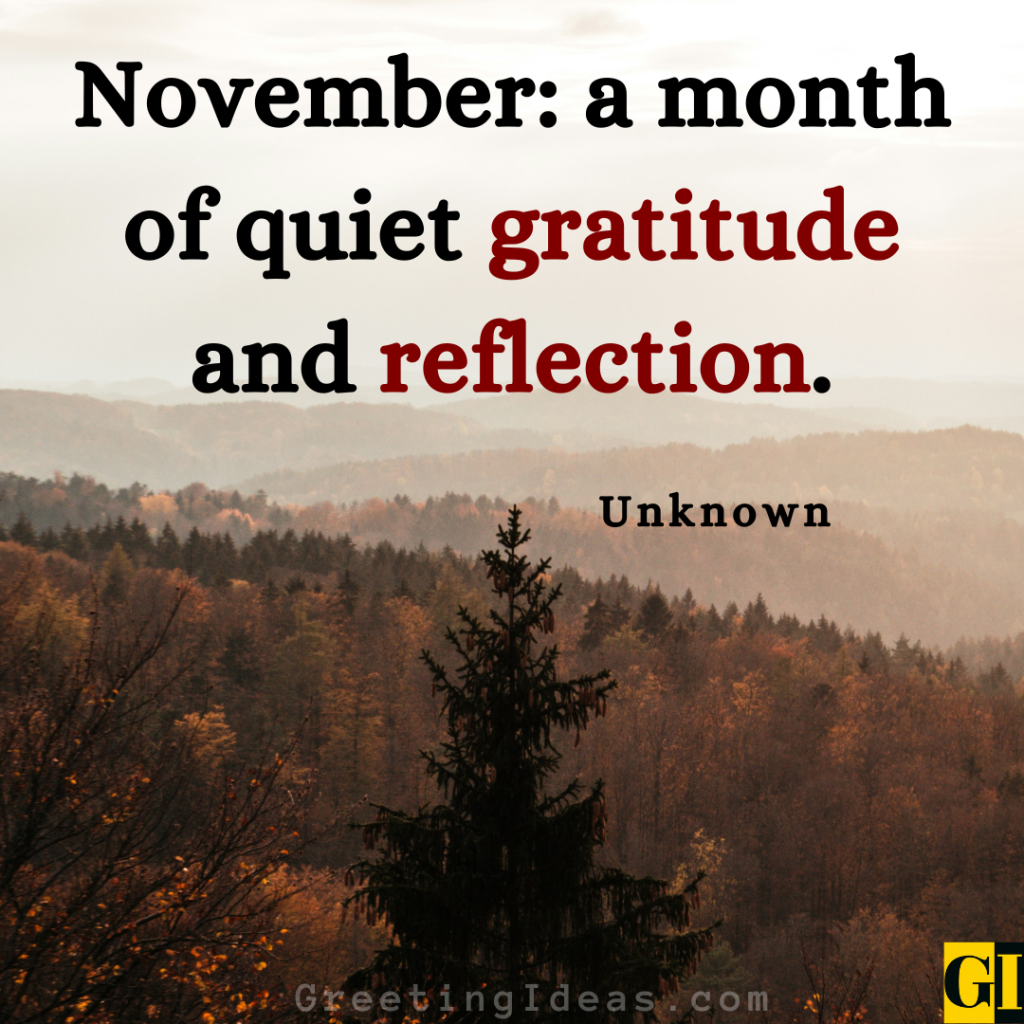
November: the month when you realize you’re not ready for the holidays but they’re coming anyway. — Internet humor
This comedic truth acknowledges the universal feeling of being unprepared for the approaching holiday season rush.
Internet humor emerges collectively from social media platforms, meme culture, and online communities where users create and share relatable observations that go viral through shared experience.
November is basically one long Sunday. — Social media joke
This funny comparison captures the month’s slower, contemplative energy that feels like an extended lazy weekend.
Social media jokes represent a new form of folk humor, created and shared across platforms like Twitter, Instagram, and Facebook, gaining popularity through likes, shares, and collective recognition.
November: when leaves stop falling and your motivation joins them on the ground. — Modern meme
This playful observation links seasonal changes to the common experience of waning productivity as winter approaches.
Modern memes combine text and imagery to create shareable humor that spreads rapidly through digital networks, representing contemporary culture’s primary form of comedic expression.
I love November because it’s acceptable to eat pie for breakfast. — Food humor
This celebrates the month’s holiday, an excuse for indulgent eating habits that would otherwise seem inappropriate.
Food humor has become a distinct internet genre, with anonymous contributors creating jokes about eating habits, diet failures, and culinary adventures that resonate across social media.
November is sweater weather and regretting every summer body goal you set. — Gym humor
This self-deprecating joke acknowledges how bulky clothing provides convenient cover for abandoned fitness resolutions.
Gym humor circulates through fitness communities and mainstream social media, using self-deprecation to bond over universal struggles with motivation, diet, and exercise commitments.
Also Read: 50 Positive Calm Mind Quotes To Remove Anxiety
November: when you go to work in the dark and come home in the dark and wonder if you’re a vampire. — Daylight savings humor
This exaggeration perfectly captures the disorienting experience of shortened daylight hours after clock changes.
Daylight savings humor emerges annually as people collectively process the jarring time change through jokes shared across social media platforms during seasonal transitions.
November is the month where I’m equally excited about Thanksgiving dinner and equally stressed about making it. — Cooking humor
This relatable admission expresses the dual emotions of anticipation and anxiety surrounding holiday meal preparation.
Cooking humor captures the universal experience of kitchen challenges, recipe disasters, and holiday meal stress, shared widely through food blogs, social media, and online communities.
November weather: Mother Nature can’t decide if she wants to freeze you or just make you slightly uncomfortable. — Weather joke
This personification humorously describes the month’s unpredictable and often frustratingly moderate temperature fluctuations.
Weather jokes are a staple of social media humor, with users across regions sharing observations about local climate quirks that resonate through their relatability and timing.
Also Read: 45 Hello August Quotes To Celebrate Last Days Of Summer
Late Autumn Wisdom and Seasonal Reflections
The year’s eleventh chapter brings profound contemplation as nature demonstrates graceful acceptance of change.
These meditative expressions honor the quiet beauty of transition, the wisdom found in letting go, and the peaceful preparation that precedes dormancy and eventual renewal.
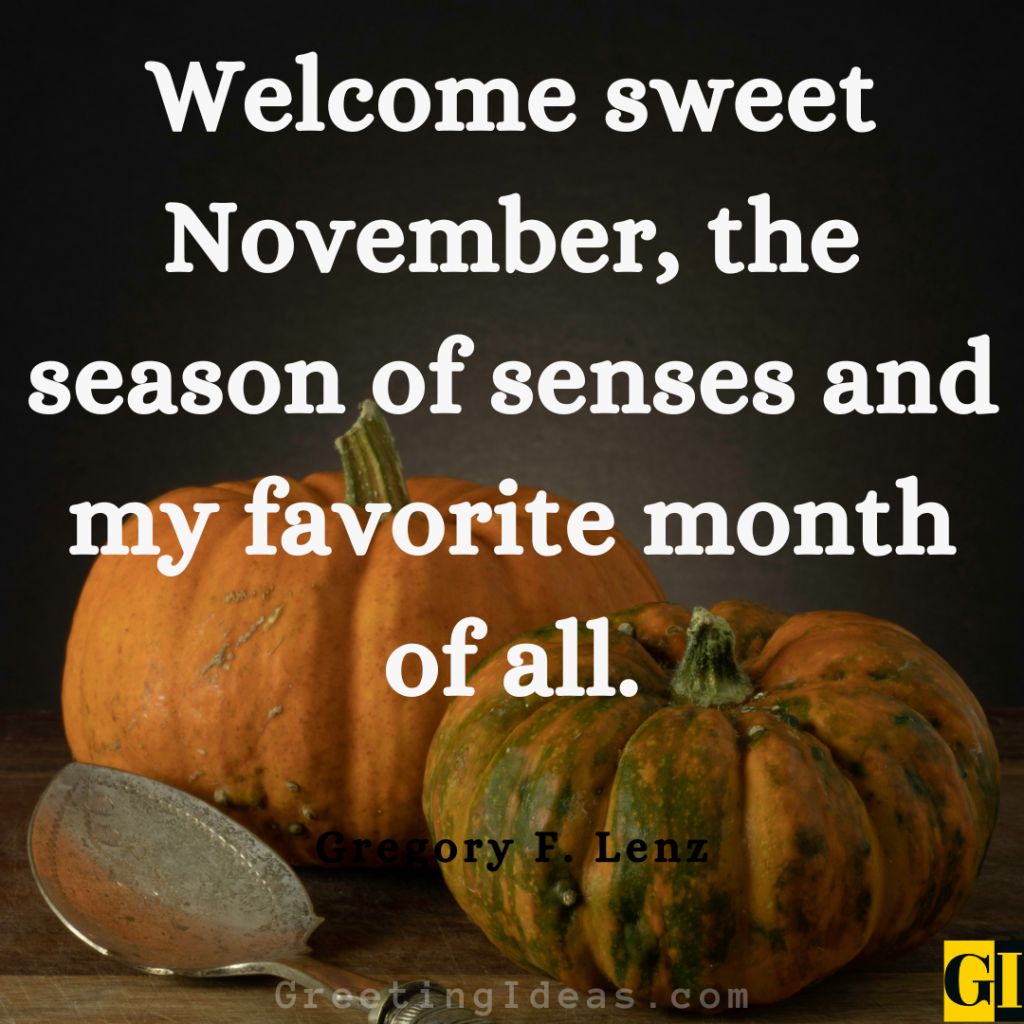
November is the time to remind us that we are all thankful for so many things in our lives. — Contemporary meditation
This simple statement positions the month as an annual checkpoint for conscious appreciation practice.
Contemporary meditations blend mindfulness teachings with seasonal awareness, created by meditation teachers, wellness coaches, and spiritual writers for modern practitioners seeking grounding and presence.
There is a harmony in autumn, and a luster in its sky, which through the summer is not heard or seen. — Percy Bysshe Shelley, English Romantic poet
Shelley identifies unique atmospheric qualities specific to autumn that other seasons cannot replicate or match.
Percy Bysshe Shelley (1792-1822) was a major English Romantic poet known for radical political views and lyrical verses celebrating nature, imagination, and revolutionary ideals before his tragic drowning at age 29.
November’s palette is muted magnificence—proof that beauty doesn’t need to shout. — Modern observation
This celebrates the month’s subdued color scheme as demonstrating that elegance can exist in subtlety.
Modern observations about seasonal aesthetics emerge from nature writers, photographers, and contemplative practitioners who find spiritual and artistic meaning in environmental changes throughout the year.
The silence of November brings clarity that summer’s noise could never provide. — Contemporary wisdom
This contrasts seasonal energies, suggesting that quiet contemplation enables insights impossible during busier times.
Contemporary wisdom synthesizes ancient contemplative traditions with modern psychology and mindfulness practices, offering insights for people navigating busy contemporary lives seeking meaning and peace.
November strips away pretense, leaving only what’s real and rooted. — Philosophical reflection
This metaphor about bare trees extends to human experience, valuing authenticity revealed when excess falls away.
Philosophical reflections on seasons draw from multiple wisdom traditions, combining observation of natural cycles with insights about human psychology, authenticity, and personal growth.
In November, the earth remembers to rest, and perhaps we should too. — Seasonal reminder
This draws parallels between nature’s dormancy cycle and the human need for restorative pauses and self-care.
Seasonal reminders function as gentle prompts from the wellness and mindfulness community, encouraging alignment with natural rhythms in an always-on culture that often ignores cyclical needs.
November whispers what September shouts: all things must pass, and that’s okay. — Seasonal wisdom
This progression acknowledges how autumn’s beginning announces change while its end accepts change peacefully.
Seasonal wisdom represents accumulated insights from nature observers, poets, and philosophers who find life lessons in the predictable yet profound patterns of environmental transformation.
The beauty of November lies not in what remains, but in how gracefully things depart. — Contemplative saying
This shifts focus from loss to the manner of leaving, finding meaning in the process of release.
Contemplative sayings emerge from meditation teachers, hospice workers, and grief counselors who observe how natural cycles model healthy approaches to letting go and accepting impermanence.
November teaches patience—spring will come, but only after winter’s lessons. — Seasonal philosophy
This positions waiting and difficulty as necessary educational experiences rather than obstacles to be endured.
Seasonal philosophy synthesizes observations about natural cycles with insights about personal development, suggesting that life’s rhythms contain wisdom about timing, patience, and necessary processes.
In November’s quiet, we hear what our busy hearts forgot to tell us. — Meditative reflection
This suggests that seasonal stillness creates space for important internal messages to finally reach consciousness.
Meditative reflections come from contemplative teachers and mindfulness practitioners who help people access inner wisdom through seasonal metaphors and practices aligned with natural rhythms.
November asks nothing of us but to witness—to see the beauty in surrender. — Contemporary meditation
This frames the month as requiring only attentive presence to appreciate transformation without resistance.
Contemporary meditations adapt ancient contemplative practices for modern seekers, using accessible language to teach presence, acceptance, and finding peace within natural change and uncertainty.
The eleventh month holds space between harvest and hibernation, action and rest, doing and being. — Seasonal observation
This acknowledges the month’s liminal quality as occupying the threshold between active and passive phases.
Seasonal observations blend scientific understanding of natural cycles with philosophical and psychological insights, helping people navigate transitions by recognizing patterns in the world around them.
Also Read: 44 Beautiful Cloudy Day Quotes to Brighten Your Mood
Embracing the Spirit of This Special Month
As the leaves settle and the air turns crisp, these carefully gathered words remind us why the eleventh month holds such a tender place in our hearts.
November quotes capture something profound yet simple—the art of pausing, appreciating, and letting go with grace.
Whether you’re drawn to the humor that makes holiday chaos bearable, the gratitude reflections are perfect for
Thanksgiving gatherings, or the contemplative wisdom that mirrors bare branches against gray skies, there’s something here that speaks to your soul.
These timeless expressions from poets, philosophers, and everyday observers invite us to slow down and notice the quiet beauty surrounding us.
Share your favorite quote with a friend who needs encouragement, post an image that resonates with your mood, or simply bookmark a few lines to revisit when the days grow darker.
Download the images for your journal, send them in greeting cards, or display them where you’ll see daily reminders of gratitude and grace.
Let these reflections guide you toward a more thankful, peaceful close to the year.
Autumn’s Inspirational Sayings Answered
What is November known for?
The eleventh month is celebrated for Thanksgiving traditions, gratitude practices, and autumn’s graceful transition into winter.
It marks the season of harvest celebrations, family gatherings, cozy sweaters, and falling leaves.
Cultural observances include Veterans Day, while nature displays its final burst of golden beauty before dormancy begins.
Also Read: 50 Always Be Grateful Quotes For A Blessed Life
What are the best November quotes for Instagram?
Short, visually poetic lines work perfectly for social media.
Gratitude turns what we have into enough.
The trees are about to show us how lovely it is to let things go.
Pair inspirational autumn sayings with cozy imagery, fall colors, or Thanksgiving table settings for maximum engagement and shares.
Why do people share seasonal reflections during this month?
November quotes resonate because they capture universal experiences—thankfulness, reflection, and bittersweet transitions.
As the year winds down, people naturally seek words that validate their emotions and inspire gratitude.
Sharing meaningful expressions helps connect communities during holiday preparations while encouraging mindful appreciation for life’s blessings and seasonal transformations.
